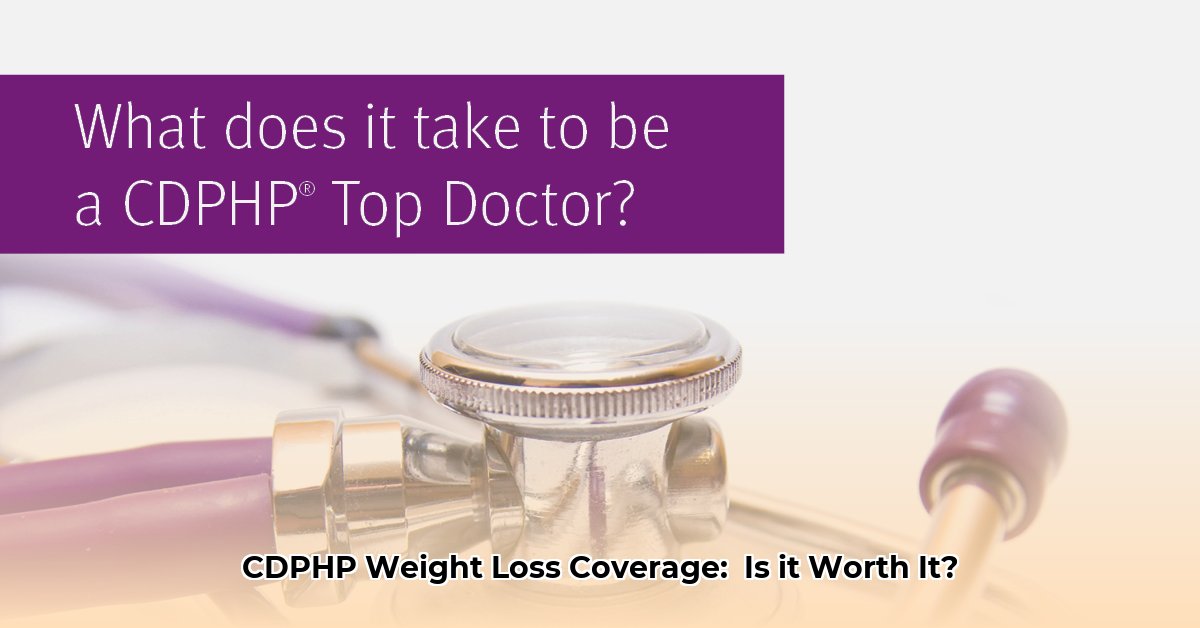
What Weight-Loss Medications Does CDPHP Cover?
CDPHP's coverage of weight-loss medications varies depending on your specific plan and may include FDA-approved options. To determine precisely which medications are covered under your plan, review your policy documents or contact CDPHP directly at [Insert CDPHP Contact Information Here]. Your physician can also provide guidance on medications typically covered by CDPHP. Many plans cover some GLP-1 receptor agonists such as Ozempic or Wegovy (brand name only), but availability and restrictions on generics will vary according to your specific plan. Always check your policy for details.
Am I Eligible for CDPHP's Weight Loss Medication Coverage?
Eligibility for CDPHP's weight loss medication coverage typically requires meeting specific criteria. A high Body Mass Index (BMI) is often a key factor, but other health conditions may also influence eligibility. Your physician will conduct a comprehensive assessment, considering your medical history, current health status, and other relevant factors to determine suitability for weight-loss medication and CDPHP coverage.
Have you considered the potential long-term benefits of weight loss on your overall health? A recent study showed a [Insert Statistic on Weight Loss Benefits Here] reduction in associated health risks. Your doctor can discuss these benefits with you.
Step-by-Step Guide to Accessing CDPHP's Weight Loss Medication Coverage
Accessing CDPHP's weight-loss medication coverage involves several steps:
Doctor's Consultation: Schedule an appointment with your primary care physician or a specialist within CDPHP's network to discuss weight loss goals and the suitability of medication. This initial consultation is vital to determine if medication aligns with your health needs and if CDPHP coverage is feasible.
Prescription: If medication is deemed appropriate, your doctor will write a prescription for a covered medication taking into account your individual needs, medical history, and any potential interactions with other medications you may be taking. Many pharmacies can check your specific CDPHP plan's formulary to ensure medication coverage.
Pre-Authorization (If Required): Some medications may require pre-authorization from CDPHP. Your doctor's office will typically handle this process, submitting the necessary paperwork to ensure coverage is secured before the prescription is filled. This step is critical to avoid unexpected out-of-pocket costs.
Prescription Fulfillment: Fill your prescription at a CDPHP network pharmacy to simplify billing and claims processing. Ensure you pick the correct pharmacy to streamline your payment procedures.
Claims Processing: CDPHP generally processes claims automatically if you use a network pharmacy. However, it's advisable to verify coverage and understand your out-of-pocket costs. Confirming the coverage prior to receiving your prescription greatly reduces the risk of unexpected bills.
Understanding Your Out-of-Pocket Costs
Before starting any weight-loss program, understanding your financial responsibility is crucial. Your out-of-pocket costs will consist of co-pays, deductibles, and any applicable coinsurance. Refer to your CDPHP plan documents for comprehensive details on these costs so you are adequately prepared. Detailed knowledge about the payment structure decreases financial burdens.
Beyond Medication: Additional Weight Loss Support from CDPHP
CDPHP may offer additional weight-loss support programs, such as telehealth sessions with registered dieticians or nutritionists, or access to weight-loss support groups. These programs can complement medication and enhance your chances of success. Inquire with your doctor or CDPHP directly about available programs. A holistic approach is often found to be more effective long term.
Frequently Asked Questions (FAQ)
Q: How can I determine the exact medications covered by my CDPHP plan? A: Review your CDPHP policy documents or contact CDPHP member services directly for the most up-to-date information. Your physician’s office should also be a valuable resource.
Q: What should I do if my doctor prescribes a medication not covered by CDPHP? A: Discuss alternative options with your physician. They can often suggest comparable medications that are covered under your benefit plan.
Q: What steps should I take if I don't achieve the desired results from the medication? A: Maintain open communication with your physician. They will monitor your progress and adjust your treatment plan as needed. This might include changing your dosage, switching medications, or suggesting additional support approaches.
Conclusion
CDPHP's weight loss medication coverage is individualized. The duration depends on multiple factors, including your progress, physician recommendations, and CDPHP's plan guidelines. Maintaining open communication with your doctor and CDPHP is key for a streamlined process. Remember, achieving a healthy weight is a journey, and understanding your insurance coverage helps you navigate that path effectively. For further assistance, contact CDPHP member services at [Insert CDPHP contact information here].